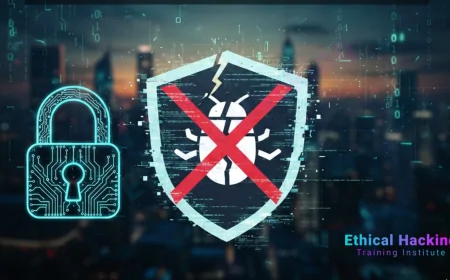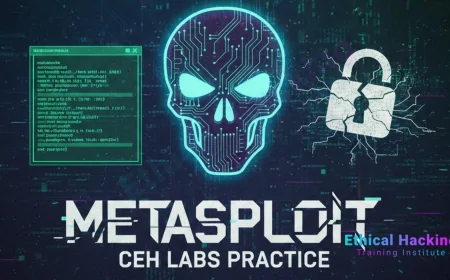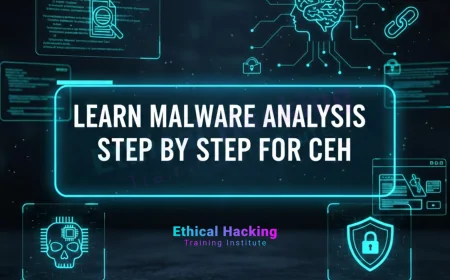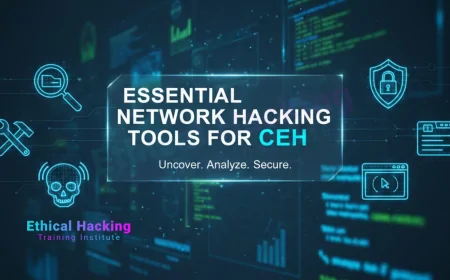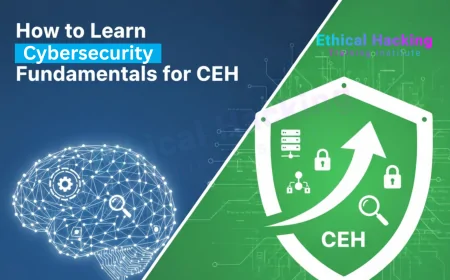How to Prepare for the CPENT Exam | Top Study Tips, Tools & Resources
Master your CPENT exam preparation with expert study tips, essential tools, and proven resources. This guide covers everything from hands-on lab practice to exam strategy to help you confidently pass the CPENT and boost your ethical hacking career.
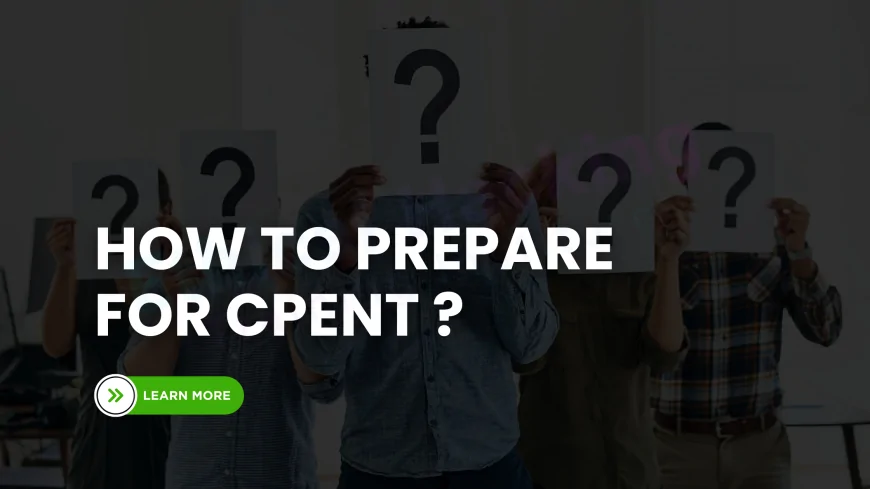
Imagine this: You're sitting in front of your terminal, facing a 24-hour live test environment where every move counts, every second ticks down, and real-world cyber threats are your playground. This isn’t just any certification exam—this is CPENT: Certified Penetration Testing Professional.
The CPENT exam isn't designed for memorization or shallow technical understanding. It’s crafted for those who can think laterally, act ethically, and solve real-world cybersecurity problems in live environments. Preparing for such an intense exam requires a different mindset, a well-structured strategy, and access to the right resources.
Whether you're an ethical hacker, red teamer, or penetration tester looking to prove your skills, this guide will help you break down how to prepare for the CPENT exam with confidence.
What Is the CPENT Exam?
The Certified Penetration Testing Professional (CPENT) exam is a hands-on, performance-based test that evaluates your skills in advanced penetration testing and red teaming. Unlike traditional multiple-choice exams, CPENT gives you access to a virtual environment for 24 hours, where you must exploit vulnerabilities, pivot through networks, and bypass security layers.
Key Features:
-
Real-world simulation
-
24-hour practical test
-
Web application, IoT, OT, cloud, and binary exploitation
-
Scoring system: Achieve 70% for CPENT and 90%+ for LPT (Master)
Skills Measured in CPENT
Before diving into study strategies, understand the core skill areas CPENT covers:
1. Advanced Network Scanning
-
Host discovery
-
Network enumeration
-
OS fingerprinting
2. Web Application Attacks
-
XSS, SQLi, IDOR, CSRF
-
Authentication bypass
-
Privilege escalation via web interfaces
3. Binary Exploitation
-
Stack buffer overflow
-
ASLR bypass
-
Shellcode injection
4. Active Directory Exploitation
-
Kerberoasting
-
Pass-the-Hash
-
Exploiting misconfigurations
5. Privilege Escalation
-
Linux/Windows techniques
-
Misconfigured services
-
Exploiting SUID binaries
6. Cloud & IoT Security
-
AWS misconfigurations
-
Device emulation & attack surface analysis
7. Evading Defense Mechanisms
-
AV/EDR bypass
-
Obfuscation
-
Payload crafting
Step-by-Step Guide to Preparing for the CPENT Exam
Step 1: Understand the CPENT Blueprint
Start with the exam objectives. CPENT outlines all the domains and skills you’ll be tested on. Break down the blueprint into weekly learning segments. This is your curriculum, your game plan.
Pro Tip: Keep the blueprint printed or saved on your desktop. Check off skills as you master them.
Step 2: Master the Fundamentals First
Don’t skip the basics. Even though CPENT is advanced, your foundational knowledge of:
-
Networking
-
Operating systems (Windows & Linux)
-
Web applications
-
Programming (Python, Bash, PowerShell)
…will be your strongest asset.
You can’t exploit what you don’t understand.
Step 3: Build a Home Lab
A solid home lab is your dojo. You need a playground to test, fail, and learn. Set up:
-
Virtual Machines (Kali Linux, Metasploitable, Windows Server, OWASP BWA)
-
Cloud Platforms (Free-tier AWS/Azure for cloud exploitation)
-
Simulated Networks with domain controllers and segmented environments
Tools you’ll use often:
nmap,Burp Suite,Metasploit,Impacket,Responder,BloodHound,Mimikatz
Step 4: Use CPENT-Specific Practice Labs
While we’re avoiding brand names, some platforms offer CPENT-style labs. You’ll need exposure to:
-
Pivoting between networks
-
Web app and API hacking
-
Binary exploitation
-
Post-exploitation scenarios
Practice lateral movement and privilege escalation across different operating systems.
Step 5: Deep Dive into Each Domain
Here’s how you can approach each CPENT domain:
Web App Exploitation
-
Practice bug bounty challenges
-
Use OWASP Juice Shop, DVWA, or custom vulnerable apps
-
Focus on WAF evasion, parameter tampering, and JWT manipulation
Binary Exploitation
-
Start with basic buffer overflows
-
Learn fuzzing, return address manipulation, and ROP chains
-
Tools:
GDB,pwndbg,radare2,ROPgadget
Active Directory
-
Build an AD lab with real-world misconfigs
-
Practice Kerberoasting, AS-REP Roasting, Silver/Golden Ticket attacks
-
Use
BloodHound,SharpHound,evil-winrm,CrackMapExec
Cloud & IoT
-
Learn cloud misconfigurations like open S3 buckets, IAM privilege escalations
-
Simulate IoT with device emulators or firmware dumps
AV and EDR Evasion
-
Write and obfuscate payloads using
msfvenom,Veil, orNim -
Understand how AV signatures work
Step 6: Track Your Progress with Challenges
Use challenges like:
-
Capture The Flag (CTF) platforms
-
Time-boxed practice environments
-
Red Team vs Blue Team simulations
Set 24-hour practice runs to mimic real exam stress.
Step 7: Document Everything
Create your personal hacking playbook:
-
Commands
-
Scripts
-
Exploitation flow
-
Tools and their usage
-
Enumeration checklists
During the exam, your notes can save hours.
Step 8: Practice Reporting
Yes, CPENT requires you to submit a report. Practice writing:
-
Executive summaries
-
Technical breakdowns
-
Proof of concepts (screenshots, commands, logs)
A clean, well-written report can make or break your final evaluation.
Step 9: Develop Mental Endurance
This isn’t just a tech exam—it’s a marathon. You need:
-
Time management
-
Decision-making under pressure
-
Mental focus for 12–24 hours
Simulate long sessions. Take 15-min breaks every 2–3 hours to prevent burnout.
Step 10: Do a Full-Length Mock Exam
Before you sit the real test:
-
Create a 24-hour test scenario
-
Include all modules: AD, binary, cloud, pivoting, etc.
-
Set your own scoreboard to mimic scoring mechanics
This final rehearsal helps identify gaps in your preparation.
Top Study Resources for CPENT
Here’s a toolbox of resource types (without promoting platforms):
Books
-
Linux Privilege Escalation
-
Windows Internals
-
Web Application Hacker’s Handbook
-
The Art of Exploitation
-
Practical Binary Exploitation
Practice Platforms
-
CTFs with pivoting & post-exploitation
-
Cloud lab simulations
-
AD exploitation playgrounds
-
Binary exploitation challenges
Whitepapers & Blogs
-
Offensive security techniques
-
Windows and Linux internals
-
Real-world post-exploitation case studies
Video Courses
-
Hands-on tutorials on PowerShell & Bash scripting
-
Buffer overflow walkthroughs
-
Active Directory attack chains
-
Advanced exploitation demonstrations
Common Mistakes to Avoid
-
Ignoring the Reporting Requirement
→ Practice professional documentation, not just hacking. -
Underestimating Binary Exploitation
→ Many candidates fail here—don’t skip this. -
No Time Simulation
→ 24 hours is brutal. Practice long engagements. -
Too Many Tools, Not Enough Practice
→ Master fewer tools deeply rather than juggling many. -
Failing to Learn Post-Exploitation
→ The exam rewards depth in persistence, evasion, and privilege escalation.
Mindset for CPENT Success
-
Be curious
-
Embrace failure as learning
-
Think creatively
-
Build real-world logic chains
-
Automate repetitive tasks
Final 10 Tips Before Exam Day
-
Get solid sleep before the exam
-
Keep food, water, and energy supplies nearby
-
Prepare a clean system and stable internet
-
Test VPN and remote environment access early
-
Have printed checklists and playbooks
-
Log everything with timestamps
-
Avoid overthinking—stick to what you know
-
Screenshot every flag or proof
-
Pace yourself, take short breaks
-
Submit a complete, clean report
FAQ's
1. What is the best way to start preparing for the CPENT exam in Pune?
Begin by enrolling in an advanced ethical hacking training institute in Pune that offers hands-on CPENT-style labs. Start with foundational skills in networking, Linux, and penetration testing. Use structured study plans, practical tools, and simulated environments to replicate the CPENT exam challenges.
2. Can I prepare for the CPENT exam through an Ethical Hacking Institute in Pune?
Yes, ethical hacking institutes in Pune offer focused CPENT preparation through live hacking labs, expert mentorship, and real-world red teaming simulations. These programs help candidates master advanced penetration testing techniques required to confidently pass the CPENT exam and grow professionally.
3. How does CPENT training in Pune enhance my cybersecurity career?
CPENT training in Pune equips you with hands-on experience in offensive security, red teaming, and real-world attack scenarios. This certification proves your capability to handle high-stakes cybersecurity roles, increasing job opportunities in penetration testing, threat analysis, and ethical hacking.
4. Are hands-on labs included in CPENT preparation courses in Pune?
Yes, most top ethical hacking institutes in Pune offer CPENT-specific practical labs. These include web application attacks, privilege escalation, lateral movement, binary exploitation, and Active Directory simulations, all aligned with the exam blueprint to maximize exam readiness.
5. How long does it take to prepare for the CPENT exam in Pune?
It typically takes 3–6 months of focused training at an ethical hacking institute in Pune to be CPENT-ready. This timeline includes classroom instruction, personal lab practice, reporting exercises, and 24-hour simulation challenges similar to the actual exam environment.
6. What are the prerequisites for joining a CPENT training course in Pune?
Basic knowledge of networking, Linux, Windows, and ethical hacking concepts is required. Many ethical hacking institutes in Pune recommend having CEH-level experience or certification before starting CPENT training, to ensure a strong foundational understanding.
7. Does CPENT training in Pune include reporting practice?
Yes, reporting is a crucial part of CPENT preparation. Institutes in Pune provide structured training on writing professional penetration testing reports, covering executive summaries, technical details, proof of concepts, and vulnerability mitigation strategies.
8. What tools are commonly taught in CPENT courses in Pune?
Students learn tools like Nmap, Metasploit, Burp Suite, BloodHound, Mimikatz, and Impacket. Ethical hacking institutes in Pune also teach scripting for automation and payload development using Bash, Python, and PowerShell to align with real-world penetration testing tasks.
9. Can CPENT training in Pune help with job placement?
Many institutes in Pune offer placement support with CPENT courses, connecting students to cybersecurity firms, consultancies, and corporate IT teams. The advanced skillset gained from CPENT preparation significantly increases your employability in ethical hacking and red teaming roles.
10. Are CPENT courses in Pune suitable for working professionals?
Yes, CPENT training in Pune often provides flexible schedules like evening or weekend classes to accommodate working professionals. These courses are intensive and practical, helping professionals upskill without disrupting their current job commitments.
11. What topics are covered in CPENT exam preparation courses in Pune?
CPENT training includes web application exploitation, binary exploitation, Active Directory attacks, AV/EDR evasion, pivoting, and cloud penetration testing. Institutes in Pune tailor these topics through guided labs and simulations to mirror CPENT’s real-world environment.
12. Do ethical hacking institutes in Pune simulate the 24-hour CPENT exam?
Yes, many top institutes in Pune include full-length CPENT practice exams. These simulate the stress, pace, and complexity of the 24-hour exam, giving students real-time experience in handling pressure and managing their time and resources effectively.
13. How important is Active Directory knowledge for the CPENT exam?
Active Directory exploitation is a key CPENT module. Ethical hacking courses in Pune emphasize AD attacks like Kerberoasting, Pass-the-Hash, and lateral movement. This knowledge is essential for scoring high and gaining real-world red teaming expertise.
14. Will I learn evasion and obfuscation techniques during CPENT prep in Pune?
Absolutely. CPENT courses in Pune teach advanced evasion techniques to bypass firewalls, antivirus software, and endpoint detection tools. You'll also learn obfuscation, payload encoding, and stealthy post-exploitation tactics to mimic real-world attackers.
15. Is binary exploitation part of CPENT courses in Pune?
Yes, institutes in Pune teach binary exploitation as part of CPENT preparation. You’ll learn stack buffer overflows, shellcode injection, ASLR bypassing, and ROP chaining, using real binaries to build deep exploitation skills.
16. What programming skills are needed for CPENT training in Pune?
Basic scripting in Python, Bash, and PowerShell is crucial. CPENT courses in Pune help you understand payload development, automation, and system scripting. These skills enhance your exploitation capabilities and help with bypassing security controls.
17. How does CPENT certification impact your ethical hacking salary?
CPENT-certified professionals often earn significantly more due to their validated hands-on skills. In Pune, many employers consider CPENT a high-value credential, leading to better job roles, senior-level responsibilities, and increased salary brackets in cybersecurity.
18. Are online CPENT courses available in Pune?
Yes, ethical hacking institutes in Pune offer both classroom and online CPENT training. Online courses include virtual labs, live instructor sessions, and access to CPENT-style environments, allowing students to prepare from anywhere with full support.
19. Is CPENT training in Pune recognized by cybersecurity employers?
Yes, CPENT preparation from a reputable ethical hacking institute in Pune is well-regarded by hiring managers in the cybersecurity industry. It reflects your practical penetration testing ability and your readiness for real-world threat engagements.
20. What makes CPENT training in Pune different from other certifications?
Unlike theory-heavy certifications, CPENT training in Pune focuses on real attack scenarios, post-exploitation, and lateral movement in enterprise networks. The 24-hour live challenge format tests real skill, making it one of the most respected certifications in ethical hacking.
From Student to Cyber Warrior
Becoming CPENT-certified is a milestone in your cybersecurity journey. It’s not about passing a test; it’s about proving your ability to penetrate systems, navigate real-world threats, and document it all like a professional.
If you follow this guide, create your lab, challenge yourself through realistic simulations, and stay consistent—you won’t just be ready for CPENT, you’ll be ready for real-world red teaming.
What's Your Reaction?
 Like
0
Like
0
 Dislike
0
Dislike
0
 Love
0
Love
0
 Funny
0
Funny
0
 Angry
0
Angry
0
 Sad
0
Sad
0
 Wow
0
Wow
0
